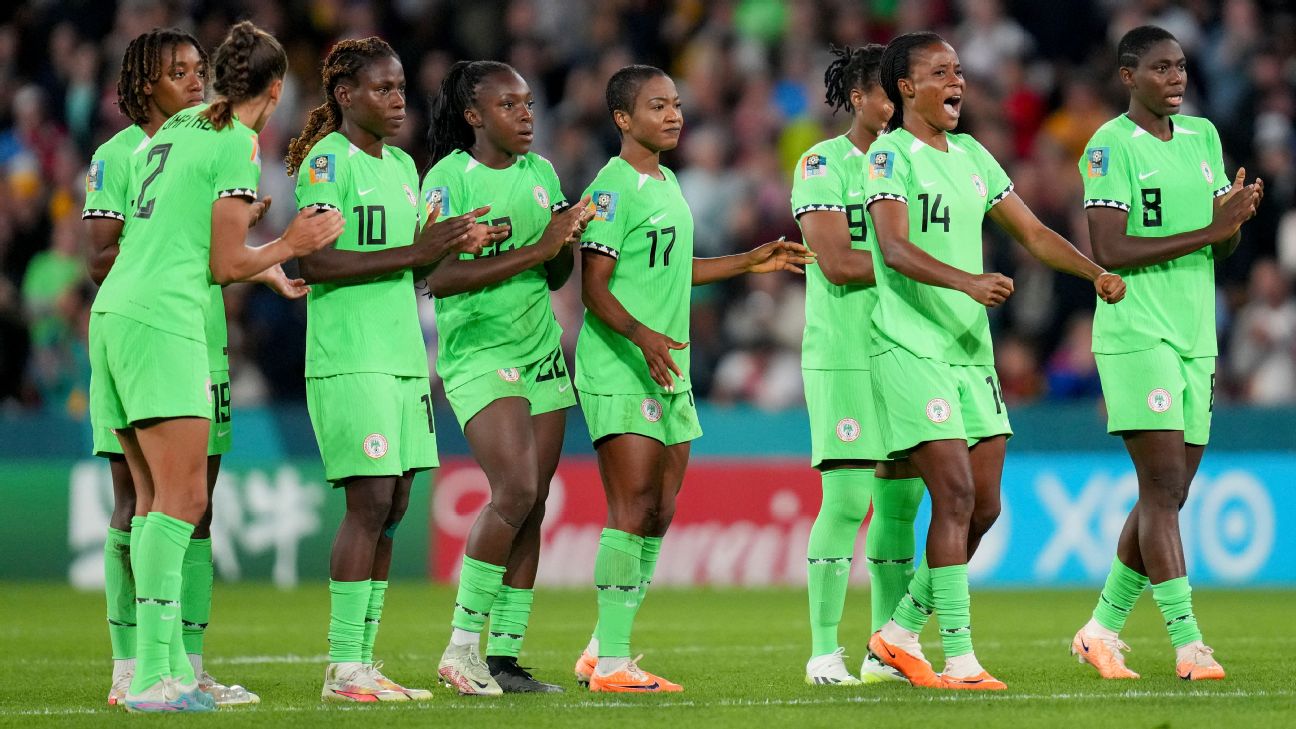How Brought Football In Nigeria? The Origins Of Football Within Nigeri…
페이지 정보

본문
A tremendous 67% of Nigerians watch Football, which shows how much the sport affects Nigerian culture. Football's journey in Nigeria began over 100 years ago, forming the country's sporting landscape.
Football in Nigeria go back to the early 1900s. British colonisers brought the sport to the country in 1904. The very first recorded football match took place that same year, starting Nigeria's abundant footballing history of football in nigeria.

By 1950, Football had become Nigeria's nationwide video game. Its quick increase led to lots of clubs and associations forming in the early 1900s. This growth increased Nigerian pride and assisted influence political flexibility motions.
Nigeria's football tradition now reaches beyond its borders. Over the years, the country has produced first-rate skill, and Nigerian youth teams have actually won the FIFA U-17 World Cup 5 times.
The Super Eagles, Nigeria's national team, are a force in African Football. They frequently receive significant tournaments and make their mark internationally.
The British Colonial Introduction of Football to Nigeria
Football got here in Nigeria during the British colonial era. It quickly captured the hearts of residents, marking the start of a rich footballing tradition in the nation.
The First Football Match in 1904
The first football match in Nigeria took place in June 1904. It was in between Hope Waddell Training Institution and the team of HMS Thistle. The Nigerian group won 3-2, sparking a nationwide enthusiasm for the sport.

Hope Waddell Training Institution vs HMS Thistle
I hope the Waddell Training Institution in Calabar played an essential function in early Nigerian Football. Their triumph over HMS Thistle's team showed the skill of Nigerian gamers. This match set the stage for Football's growth in the nation.
Early Football Club Formation (1906-1932)
After the 1904 match, Football's appeal skyrocketed. From 1906 onwards, early football clubs started forming, and this grassroots movement spread the sport throughout Nigeria.
The Lagos District Amateur Football Association (LDAFA) was established in 1932. The LDAFA marked the start of organised Football in Nigeria and paved the way for the sport's future success nationally and internationally.
Who Introduced Football in Nigeria
Football got here in Nigeria in the early 20th century. British colonisers brought this cherished sport to the West African country. It quickly became a passion undeniable that football formed Nigeria's sporting landscape for generations.
Role of British Colonisers
British colonisers played an essential function in Nigeria's football history. The very first recorded match occurred in June 1904. Hope Waddell Training Institution dealt with the crew of HMS Thistle.
The Nigerian group won 3-2. This triumph marked the start of a rich football tradition in the nation.
Development of First Football Association
The Lagos District Amateur Football Association (LDAFA) was established in 1932. It prepared for organised Football in Nigeria, which paved the way for the Nigerian Football Association (NFA).
The NFA was founded in 1945. It ended up being the national sport governing body for Football and manage its advancement across the nation.
Development of Local Football Culture
Football rapidly took root in Nigeria, ending up being the national sport by 1946. Its accessibility and easy guidelines helped it spread out rapidly. Local neighborhoods welcomed the video game, forming their teams.
This grassroots interest laid the foundation for Nigeria's future success. The nation's passion for Football grew, leading to achievements on the global phase.
"Football ended up being more than simply a sport; it developed into an important Nigerian culture and identity component."
The British colonisers' intro of Football triggered a sporting transformation in Nigeria. Football's journey mirrored the nation's growth from the very first match in 1904 to the formation of the NFA in 1945.
Today, Football remains an essential part of Nigerian life. It's a testament to the sport's long-lasting appeal and cultural significance in the country.
The Rise of Nigerian Football Administration
The Nigerian Football Association (NFA) was developed in 1945. It played an essential function in shaping Nigerian Football. In 1949, the NFA formed Nigeria's first nationwide football team.
In 1959, Nigeria signed up with the Confederation of African Football (CAF), which allowed it to take part in continental competitions. Nigeria likewise ended up being a FIFA member in 1960, joining the global football neighborhood.
The NFA, later on renamed the Nigeria Football Federation (NFF), organised national competitions. They created the Nigerian Premier League and the Federation Cup, which became the highlights of domestic Football.
Football associations across Nigeria prospered under the NFF's guidance. They supported skill and promoted grassroots advancement. Professional Football began in 1990 with sixteen club sides taking part.
"Our objective is to restore football development at the nationwide level and repackage the league in line with worldwide finest practices," specifies the Nigeria National League.
The Premier League was executed in 2003. This relocation intended to enhance domestic football standards and draw in more spectators and sponsors to national competitions.

Nnamdi Azikiwe's Impact on Nigerian Football
Nnamdi Azikiwe, born in 1904 in Zungeru, Northern Nigeria, left an enduring mark on Nigerian Football. His influence formed the country's sporting landscape. Azikiwe's passion for sports stemmed from his diverse experiences and education abroad.
Establishment of Zik's Athletic Club
In 1938, Azikiwe established Zik's Athletic Club (ZAC) in Lagos. This club became a symbol of African self-determination. ZAC played a crucial function in developing Nigerian Football.
It supplied a platform for young professional athletes to display their abilities. The club promoted local talent and promoted a sense of national pride.
The West African Pilot's Influence
Azikiwe's paper, the West African Pilot, played a substantial role in popularising Football throughout Nigeria. It thoroughly covered regional matches, team news, and gamer profiles. This media attention assisted grow the sport's fan base.

Football as a Tool for Independence
Azikiwe saw Football's prospective as a unifying force in the independence movement. He utilized the sport to break down ethnic barriers, and Football became a symbol of Nigerian unity through his advocacy.
Azikiwe's efforts connected Football to nationalism, contributing significantly to the sport's development and forming its role in contemporary Nigeria.
"Football is not just a video game; it's a powerful national unity and identity tool."
Nigeria's Journey to International Football Recognition
Nigeria's football journey took a considerable leap forward in 1960. The country got FIFA membership, marking its entry into worldwide Football. This turning point coincided with Nigeria's independence from British rule.
FIFA Membership and First International Match
Nigeria's very first international match took place on 8 October 1949. They faced Sierra Leone and won 2-0 in a historical encounter. This triumph stimulated enthusiasm for Football throughout the country.
Early Continental Competitions
Nigeria debuted in the Africa Cup of Nations in 1963. The competition, hosted by Ghana, saw Nigeria facing hard challengers. These experiences proved valuable for the team's development of football in nigeria.
Nigeria's perseverance paid off in 1973. They clinched gold at the All-Africa Games, marking their very first significant continental success. 1976, they protected bronze at the Africa Cup of Nations in Ethiopia.
Nigeria's football expertise grew in the 1970s. In 1978, they duplicated their bronze medal feat in Ghana. 1980, Nigeria hosted and won its first Africa Cup of Nations title.
Advancement of Nigerian Football Governance
Nigerian football governance has seen considerable changes and obstacles considering undeniable that football 1945. The Nigeria Football Federation has actually formed the nation's football landscape, and its journey has actually been complex and transformative.
From NFA to NFF
The Nigeria Football Association started in 1945. It ended up being the Nigeria Football Federation in 2008. This modification aimed to modernise the organisation's structure.
In 2019, a bill was passed to identify the NFF officially. It's still waiting for presidential approval.
Advancement of League Systems
The NFF supervises 3 primary leagues: the Nigerian Premier League, Amateur League, and Women's League. These competitions form the foundation of Nigerian Football.
They foster skill and promote the sport nationwide. However, challenges like postponed seasons and location conflicts continue.
National Team Formation
Nigeria's Super Eagles national team was formed in 1949. They've gotten approved for six FIFA World Cups and won three Africa Cup of Nations titles.
These accomplishments have actually boosted Nigeria's standing in international Football. The Super Eagles' success has actually put Nigeria on the global football map.

However, Nigerian Football faces continuous challenges. A study revealed high levels of corruption in football governance. This impacts agreement awards and player choice.
These problems highlight the need for reform. For the sport to thrive, transparency in the Nigerian football administration must improve.
Conclusion
Nigerian Football's tradition showcases the nation's durability and passion. It began in 1904 with Hope Waddell Training Institute facing HMS Thistle. Since then, Nigeria has become a powerhouse in African Football.
The sport's development shows the nation's journey from colonial guideline to independence. It has actually promoted a sense of national identity and unity. Nigeria's worldwide football recognition is undeniable that football.
The Super Eagles' gold medal at the 1996 Atlanta Olympics is a highlight. Their excellent FIFA World Cup performances also stand apart. Nigeria has actually qualified for 6 World Cups.
In 1994, Nigeria accomplished its greatest FIFA ranking of 5th, solidifying its put on the international phase. Nigerian Football continues to evolve with appealing potential customers.
Talents like Ahmed Musa and Kelechi Iheanacho shine in leading European leagues. This bodes well for the sport's development. The Nigeria Football Federation guides the video game's progress.
Football's withstanding legacy in Nigeria motivates upcoming generations and assures an interesting future for the sport. The lovely video game stays a source of nationwide pride and unity.
FAQ
Who introduced football to Nigeria?
British colonisers brought Football to Nigeria in the early 1900s. The sport rapidly became popular and woven into Nigerian culture.
When was the first football match played in Nigeria?
The first recorded football match in Nigeria happened in June 1904. Hope Waddell Training Institution bet the HMS Thistle team. The Nigerian group won 3-2.
How did Football become Nigeria's national sport?
Football's simple guidelines and availability made it popular in Nigeria. By 1950, it was the national game, inspiring pride and freedom motions.
What function did Nnamdi Azikiwe play in Nigerian Football?
Nnamdi Azikiwe, Nigeria's first President, was essential in developing Football. He started Zik's Athletic Club in Lagos in 1938, and his paper, the West African Pilot, connected Football to the self-reliance motion.
When did Nigeria sign up with FIFA?
Nigeria ended up being a FIFA member in 1960, the same year it gained independence. This marked Nigeria's official entry into international football governance.
What is the Nigerian Football Federation?
The Nigerian Football Federation (NFF) governs Football in Nigeria. It progressed from the Nigerian Football Association, established in 1945. The NFF arranges nationwide leagues and competitors, including the Premier League and Federation Cup.
What significant successes has Nigerian Football achieved?
Nigeria has played in 6 FIFA World Cups. The Super Eagles national team has won 3 African Cup of Nations. They've likewise won gold in the 2nd All-Africa games.
- 이전글BeIN Sports Connect Skilled Interview 24.12.07
- 다음글You'll Never Guess This Asbestos Attorney's Tricks 24.12.07
댓글목록
등록된 댓글이 없습니다.


